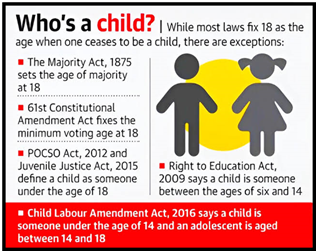PREVIOUS
Child Sexual Exploitative and Abuse Material
September 30 , 2024
452 days
596
0
- The Supreme Court recently held that viewing in private, downloading, storing, possessing, distributing or displaying the pornographic acts involving children attract criminal liability under the POCSO Act.
- This verdict has overturned a contentious Madras High Court decision from earlier this year.
- The Madras High Court had previously held that “mere possession” of such material did not violate the law unless the individual had actively “used a child or children for pornographic purposes.”
- But the SC concluded that not only physical possession but also “constructive possession” would also fall under Section 15 of the POCSO Act, even if the person did not actively produce or distribute the content.
- Constructive possession is the power to control the material, combined with knowledge of that control.

Leave a Reply
Your Comment is awaiting moderation.


